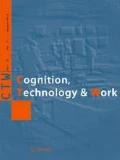Abstract
In 1981, a technical report was published with the somewhat enigmatic title ‘Coping with complexity.’ Its purpose was to discuss how computers could be used to assist process plant operators in coping with complex situations during plant disturbances. Today, coping with complexity is a problem not only for process plant operators but for everyone. And while computers in 1981 were looked upon as the solution, they are now seen as the source of the problem. This paper discusses why and how the meaning of ‘coping with complexity’ has changed over the years and speculate on what may lie ahead.
Similar content being viewed by others
References
Bainbridge L (1983) Ironies of automation. Automatica 19(6):775–779
Dekker SWA, Hollnagel E (2004) Human factors and folk models. Cogn Technol Work 6(2):79–86
Dekker SWA, Woods DD (2002) MABA–MABA or abracadabra? Progress on human-automation co-ordination. Cognition. Cogn Technol Work 4(4):240–244
Feigenbaum EA, Feldman J (1963) Computers and thought. McGraw-Hill, New York
Fitts PM (1951) Human engineering for an effective air navigation and traffic control system. Ohio State University Foundation report, Columbus
Hollnagel E (1997) Designing for complexity. Seventh international conference on human- computer interaction. In: Salvendy G, Smith MJ, Koubek RJ, San Francisco, pp 217–220, 24–29 Aug USA
Hollnagel E, Woods DD (1983) Cognitive systems engineering: new wine in new bottles. Intern J Man Mach Stud 18:583–600
Hollnagel E, Woods DD (2005) Joint cognitive systems: foundations of cognitive systems engineering
Miller JG (1960) Information input overload and psychopathology. Am J Psychiatry 116:695–704
Nielsen J (1993) Usability engineering. Academic Press, Boston
Pringle JWS (1951) On the parallel between learning and evolution. Behaviour 3(3):175–215
Rasmussen J, Lind M (1981) Coping with complexity (Risø-M-2293). Risø National Laboratory, Roskilde
Shannon CE, Weaver WE (1949) The Mathematical theory of communication
Taylor F (1911) The principles of scientific management. Harper & Brothers, New York
Taylor FV, Garvey WD (1959) The limitations of a ‘Procrustean’ approach to the optimization of man-machine systems. Ergonomics 2:187–194
Vicente KJ, Rasmussen J (1990) The ecology of human-machine systems II: mediating “direct perception” in complex work domains. Ecol Psychol 2(3):207–249
Wiener N (1948) Cybernetics: or the control and communication in the animal and the machine, The MIT Press (1965)
Wiener N (1954) The human use of human beings. Cybernetics and society. MIT Press, Cambridge
Winograd T, Woods DD (1997) The challenge of human-centered design. In: Flanagan J, Huang T, Jones P, Kasif S (eds) Human-centered systems: information, interactivity, and intelligence. National Science Foundation, Washington
Woods DD (1987) Coping with complexity: the psychology of human behavior in complex systems. In: Goodstein LP, Andersen HB, Olsen SE (eds) Mental models, tasks and errors: a collection of essays to celebrate Jens Rasmussen’s 60th birthday. Taylor Francis, New York
Woods DD, Sarter DB (2010) Capturing the dynamics of attention control from individual to distributed systems: the shape of models to come. Theor Issues Ergonomics Sci 11(1–2):7–28
Author information
Authors and Affiliations
Corresponding author
Rights and permissions
About this article
Cite this article
Hollnagel, E. Coping with complexity: past, present and future. Cogn Tech Work 14, 199–205 (2012). https://doi.org/10.1007/s10111-011-0202-7
Received:
Accepted:
Published:
Issue Date:
DOI: https://doi.org/10.1007/s10111-011-0202-7




